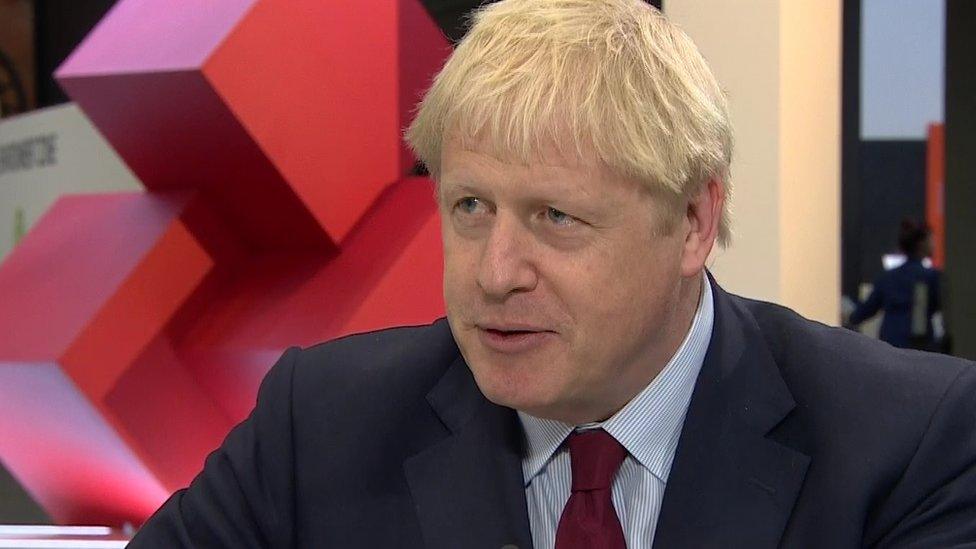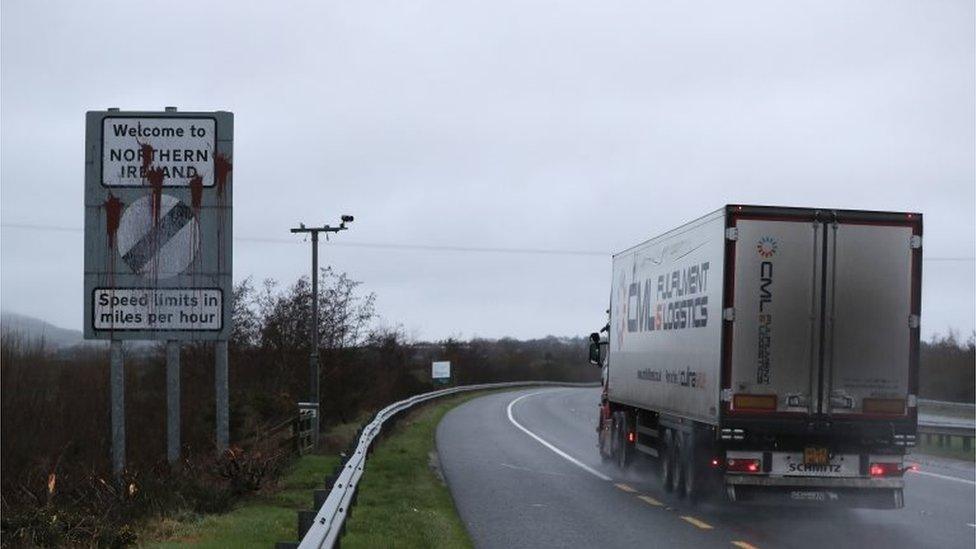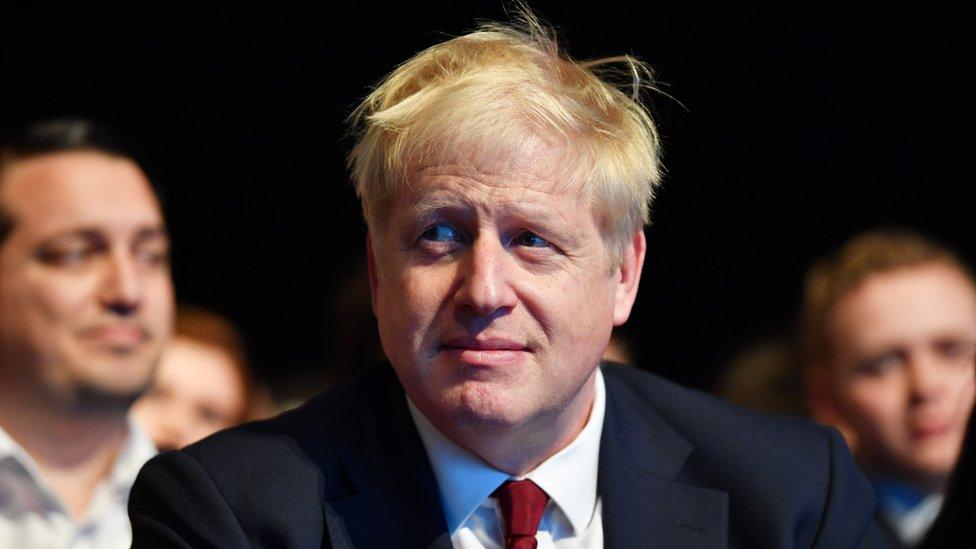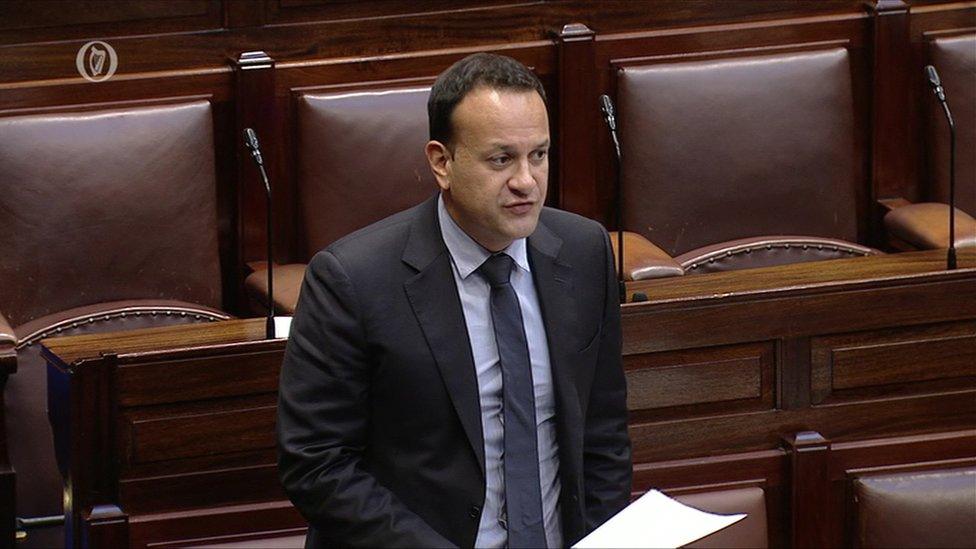What has Boris Johnson said about Brexit checks?
- Published

Boris Johnson said "no" when BBC Breakfast asked if he was planning customs checks near the Irish border
Boris Johnson has denied overnight reports that the UK had proposed "customs clearance zones" near the Irish border after Brexit.
He dismissed the reports on Tuesday morning, several hours after the idea was criticised by the Irish government.
The Irish deputy PM Simon Coveney tweeted that the idea taken from a "non-paper" was "non-starter".
So why did this make headlines in the first place? And does Mr Johnson have a new idea to replace the backstop?
Where did the customs clearance zones claim come from?
The details emerged on Monday night, when Irish broadcaster RTÉ reported it had seen extracts of Brexit proposals, external sent from the UK to the European Union.
RTÉ said would effectively create new customs posts on both sides of the border, but "five to 10 miles back from the actual land frontier".
In essence, the information appears to have come from confidential discussion documents, referred to as "non-papers", which were shared between London and Brussels last month.
These are ideas which the British government is floating ahead of its departure from the EU, but is not saying: "These are our final plans."
At least one of these papers seems to have mentioned some sort of customs clearance centres, which would be required on either side of the border.
Will customs clearance zones form part of the UK's final Brexit proposal to the EU?
The answer from the British prime minister on Tuesday morning appeared to be a firm "no".
Boris Johnson is running a mile from this notion that there would be specific customs clearance centres.
However, he is clear that Brexit will involve some forms of new checks on cross-border trade.
That is entirely consistent with the letter that he wrote to President of the European Council, Donald Tusk, shortly after he became prime minister.
At that time, Mr Johnson's commitment was that there would be no checks at the Irish border.
However, he did not rule out checks somewhere away from the border.

Companies fear new charges in cross-border trade
Will any form of post-Brexit checks be acceptable to the Irish government?
From the Irish government's point of view, they made an agreement with the UK in the 2017 Joint Report, external - a kind of interim deal - which said there would not be "any physical infrastructure or related checks and controls" as a result of Brexit.
That was not just an agreement to prevent any new infrastructure at the Irish border, it was any new infrastructure full stop.
So the Irish government's position has been that the UK agreed that the status quo would be maintained for cross-border trade.
Boris Johnson has been saying for some time now that is not credible, things would have to change because of Brexit, but that he would seek to minimise what those changes will be.
So what exactly is Boris Johnson proposing to minimise friction to cross-border trade?
We know that one of the big plans is that Northern Ireland would continue to align with the EU (and therefore the Republic of Ireland) on agri-food rules.
This is known as sanitary and phytosanitary measures - international rules which regulate food, animal and plant safety in cross-border transactions.
Is Mr Johnson proposing full alignment or just partial alignment, as suggested in one of these non-papers? I'm still not clear about that.
Has Boris Johnson said anything new about customs checks?
The prime minister has been saying there would not be customs posts at the Irish border, but there would have to be some checks somewhere.
It sounds like what he is suggesting is a process known as "Transit" which allows export declarations to be made in locations other than a customs office, such as a company premises.
In that situation, you might also have to have some sort of electronic trigger as goods vehicles cross the border.
That was contained in an idea that the technology company Fujitsu floated earlier this year.
It would also have to involve new trusted trader schemes.
These suggestions were all part of a plan known as Alternative Arrangements or Maximum Facilitation (Max Fac), both of which have been floated numerous times throughout the Brexit process.
Right at the very start of the talks, Max Fac was the UK government's plan.
More recently, the report of the Alternative Arrangements Commission, external contained a lot of these ideas.
To my mind, the prime minister now seems to be punting an amended or warmed over version of the Alternative Arrangements plan.
What are the chances of success this time?
The Alternative Arrangements plan was previously met with enormous scepticism from companies who do business across the Irish border.
They were particularly concerned by the transit procedure for customs, as most businesses would end up having to pay a customs agent.
They fear that with every cross-border transaction, whether there is a tariff or not, there would still be a cost as it would involve the services of a customs agent.
So, if the outline of the UK government's current plan is going back to Max Fac or Alternative Arrangements, frankly that is not going to get the support of either the EU or the Irish government.
However, Mr Johnson did not give the full detail of his plan on Tuesday morning, saying the UK's proposals would become clear in the next few days.
- Published1 October 2019

- Published1 October 2019
